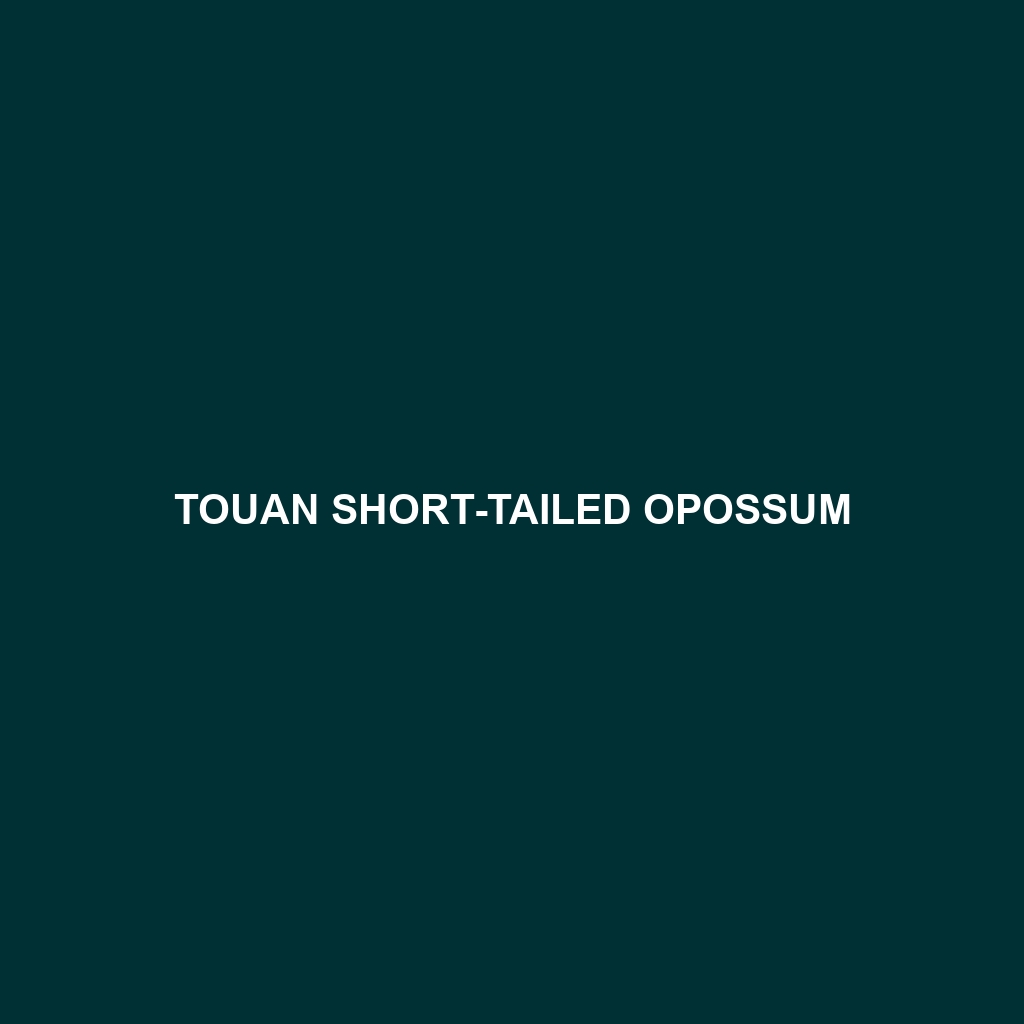Touan Short-tailed Opossum
The Touan Short-tailed Opossum (Monodelphis touan) is a small marsupial native to the Neotropical regions of South America. Known for its compact size and distinctive short tail, this opossum exhibits fascinating behavioral and ecological traits. Its adaptability to various environments and unique attributes make it a subject of interest for both researchers and wildlife enthusiasts.
Physical Characteristics
Size: The Touan Short-tailed Opossum is a small marsupial, with adults typically measuring between 10 to 15 centimeters (4 to 6 inches) in body length. The tail, true to its name, is comparatively short, usually around 5 to 8 centimeters (2 to 3 inches) long.
Weight: These opossums generally weigh between 20 to 40 grams (0.7 to 1.4 ounces).
Coloration: Their fur is primarily a rich brownish-gray on the dorsal side, with a lighter, often creamy-white underbelly. The fur is dense and soft, providing excellent insulation.
Special Features: The short tail is not prehensile, unlike many other opossum species. They have sharp claws and strong limbs, adapted for digging and climbing. Their eyes are relatively large, aiding in nocturnal activities.
Behaviors
Social Interactions: Touan Short-tailed Opossums are generally solitary animals. They come together only for mating purposes. They communicate through vocalizations and scent markings.
Feeding Habits: These opossums are omnivorous but primarily insectivorous. Their diet includes insects, small vertebrates, fruits, and occasionally, small lizards and amphibians. They are opportunistic feeders and adapt their diet based on the availability of food sources.
Ecological Roles: They play a crucial role in controlling insect populations and act as prey for larger predators, thus maintaining ecological balance.
Habitats
Range: The Touan Short-tailed Opossum is found in various parts of South America, including Brazil, Colombia, and Venezuela.
Preferred Environments: They inhabit a variety of ecosystems, from tropical rainforests to savannas and even mountainous regions. They are often found in areas with dense underbrush, which provides cover and abundant food sources.
Adaptations: Their strong limbs and sharp claws make them adept at climbing and digging, allowing them to find food and escape from predators. Their nocturnal nature helps them avoid daytime predators.
Adaptations
Nocturnal Lifestyle: Their large eyes enhance their night vision, making them effective nighttime hunters.
Thermoregulation: The dense fur not only provides insulation but also protects them from moisture and temperature fluctuations.
Dietary Flexibility: Their omnivorous diet allows them to survive in diverse environments and adapt to food availability changes.
Conservation Status
Current Status: The Touan Short-tailed Opossum is currently listed as Least Concern by the IUCN. However, habitat destruction due to deforestation and human encroachment poses potential threats to their populations.
Conservation Efforts: Efforts to preserve their habitats through sustainable land use and protected areas are crucial for their continued survival. Research and monitoring are also important to understand their population dynamics and ecological needs.
Fun Facts
Marsupium Absence: Unlike many marsupials, female Touan Short-tailed Opossums do not have a pouch (marsupium). Instead, their young cling to the mother’s teats until they are developed enough to venture out on their own.
Reproductive Rate: These opossums have a high reproductive rate, with females capable of producing multiple litters per year, each containing up to 10 offspring.
Agility: Despite their small size, they are incredibly agile and can quickly escape predators by climbing trees or burrowing into the ground.
The Touan Short-tailed Opossum is a remarkable example of nature’s adaptability and resilience, showcasing a blend of unique physical traits and survival strategies that make it a fascinating subject of study and admiration.
